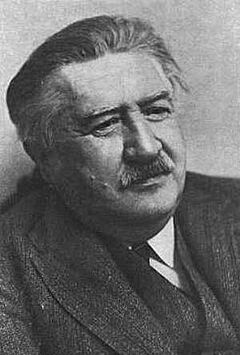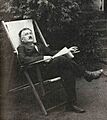Josef Suk (composer) facts for kids
Quick facts for kids
Josef Suk
|
|
|---|---|
 |
|
| Born | 4 January 1874 |
| Died | 29 May 1935 (aged 61) Benešov, Czechoslovakia
|
| Occupation |
|
Josef Suk (born January 4, 1874 – died May 29, 1935) was a famous Czech composer and violinist. He learned music from a young age and later studied with the well-known composer Antonín Dvořák. Josef Suk even married Dvořák's daughter, Otilie.
Contents
A Musician's Early Life
Josef Suk was born in Křečovice, a town in Bohemia. From a very young age, he was deeply involved in music. His father, Josef Suk Sr., taught him how to play the organ, violin, and piano. Josef also received more violin training from a Czech violinist named Antonín Bennewitz.
He studied music theory with several other composers, including Josef Bohuslav Foerster. Later, he focused on writing chamber music, which is music for a small group of instruments. His teacher for this was Hanuš Wihan. Even with all this training, many people said his musical talent was something he was born with.
Dvořák's Influence and Personal Life
Josef Suk's biggest inspiration came from another of his teachers, the famous Czech composer Antonín Dvořák. Suk was known as one of Dvořák's favorite students. They also became very close friends. Dvořák respected Suk's talent a lot.
In 1898, Suk married Dvořák's daughter, Otilie. This time was one of the happiest periods in Suk's life and his music. However, the later part of Suk's life was marked by sadness. Around 1905, within just 14 months, both his mentor Dvořák and his wife Otilie passed away. These sad events inspired Suk to write his powerful Asrael Symphony.
Suk's Musical Journey
Josef Suk is considered one of the most important composers in Czech Modernism. This was a style of music that developed in the Czech Republic. Other composers like Vitezslav Novak and Otakar Ostrčil were also part of this movement. They were all influenced by Dvořák.
Important German musicians, such as composer Johannes Brahms and critic Eduard Hanslick, noticed Suk's work early on. Later, famous Austrian composers like Gustav Mahler and Alban Berg also started to recognize his talent.
Suk mostly wrote music for instruments, especially for orchestras. One of his well-known orchestral pieces is the Serenade for Strings, Op. 6, which he wrote in 1892.
He also played in the Czech Quartet, a successful music group. However, his time with the quartet wasn't always easy. Some people criticized the group and Suk himself, especially during World War I. These criticisms made Suk sad, but they did not stop him from creating music.
Family Life and Legacy
Josef Suk married Otilie Suková-Dvořáková in 1898. She was also a composer. They had one son, also named Josef, in 1898. Sadly, Otilie died of heart failure at the age of 27 in 1905, just a year after her father. Josef Suk Jr. later became the father of the famous violinist Josef Suk, who passed away in 2011.
Suk retired from his musical career in 1933. Even after retiring, he remained an important and inspiring person for the Czech people. Josef Suk died on May 29, 1935, in Benešov, which is now part of the Czech Republic. He was buried in the cemetery of St Luke's Church in Křečovice.
His Musical Style
At first, Josef Suk's music was greatly influenced by his mentor, Antonín Dvořák. However, Suk's style changed a lot between 1897 and 1905. He might have realized that Dvořák's strong influence was limiting his own unique sound.
Sadness and deep feelings were often present in Suk's music. For example, he wrote his own funeral march in 1889. This theme also appears in his major work, the "funeral symphony" Asrael, Op. 27. Another piece, Ripening, which is a symphonic poem, also explores themes of pain and life's meaning.
However, other works showed his happiness, which he often linked to his marriage with Otilie. For instance, the music he wrote for Julius Zeyer's play Radúz a Mahulena is much brighter. Another of Suk's works, Pohádka (Fairy Tale), was inspired by his work on Radúz a Mahulena. The closest Suk came to writing an opera was his incidental music for the play Pod jabloní (Beneath the Apple Tree).
Most of Suk's original papers and musical notes are kept in Prague. There is also a new list of all his works, which includes many more of his handwritten notes and sketches than ever before.
Josef Suk once said about himself: "I do not bow to anyone, except to my own conscience and to our noble Lady Music… and yet at the same time I know that thereby I serve my country, and praise the great people from the period of our wakening who taught us to love our country."
Images for kids
See also
 In Spanish: Josef Suk (compositor) para niños
In Spanish: Josef Suk (compositor) para niños
- Josef Suk Museum, which used to be the composer's home in Křečovice.
 | Bayard Rustin |
 | Jeannette Carter |
 | Jeremiah A. Brown |



